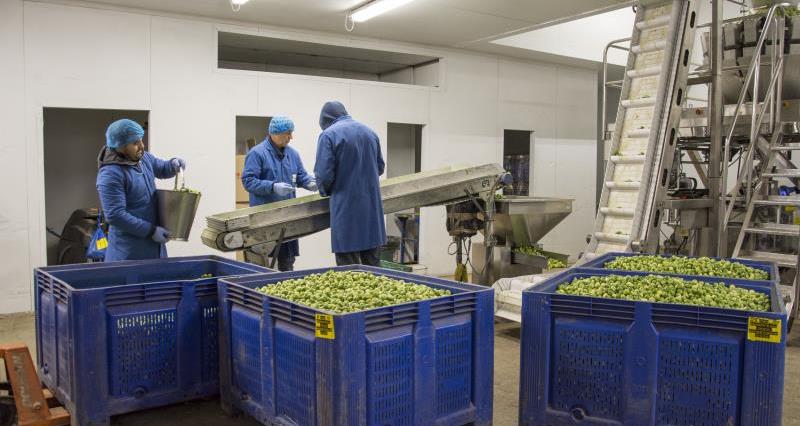Many Scottish farms and agri-food businesses are already facing seasonal labour shortages of up to 15% raising fears that stricter migration rules likely in a no-deal exit could leave crops unharvested this summer.
National Farmers’ Union Scotland’s Horticulture Working Group chairman, James Porter, this week appeared in front of an influential committee of MPs in Westminster to give evidence on the UK Government’s Immigration and Social Security Coordination (EU Withdrawal) Bill.
The Bill will repeal free movement after the UK leaves the EU and will set up the framework upon which the UK Government will create a new immigration policy after EU exit.
NFU Scotland stated on the parliamentary record, how important it was that the UK’s post-Brexit immigration system would allow workers from the EU and outside the EU to take up seasonal and permanent positions.
Spending the day in London with political affairs manager Clare Slipper, Porter also met with a number of Scottish MPs who have interests in the Immigration Bill to strongly make the case for an approach to future immigration that takes into account the needs of the labour market.
Since the vote to leave the EU became clear, NFU Scotland has consistently campaigned the government on the reliance of the agricultural industry and entire food and drink supply chain on non-UK workers.
Giving evidence to MPs on Thursday (February 14), Porter outlined that in the last year alone, many businesses have faced seasonal worker shortages of up to 15%.
Many soft fruit and field vegetable businesses across Scotland will employ hundreds of non-UK nationals to undertake seasonal work, with a large proportion returning year-on-year.
The jobs filled by foreign workers include skilled husbandry, and picking and packing work, among others.
He also set out that whilst shortages within the horticultural sector have been particularly stark, there are concerns right across the industry, with virtually no sector of Scottish agriculture not relying on non-UK workers for either primary production or further along the chain.
Labour shortage priorities
NFU Scotland’s four key priorities to tackle labour shortages are:
Migrant workers pilot
Scaling up the quota of non-EU nationals allowed to take up seasonal posts under the pilot seasonal agricultural workers scheme in 2019 and 2020.
Currently, the scheme will allow 2,500 non-EU nationals to take up posts whilst freedom of movement is still in operation during the Brexit transition. However, based on projected shortages within the industry, it is understood that 10,000 non-EU nationals will be needed within the sector in 2019.
Clarify the status of EU nationals
The UK Government must clarify the status of EU nationals in the event of a no-deal Brexit. Advice from the Government suggests that in the event of no-deal, EU nationals will still be able to come to the UK for a three-month period, following which they will need to apply for an extension of up to three years.
This is causing EU nationals considering roles in the UK, as well as Scottish employers, a huge amount of uncertainty. NFU Scotland is calling on the Government to extend the period to 12 months.
Longer term options
The UK Government is currently consulting on a new immigration system which will allow ‘low skilled’ workers to come to the UK to take up posts for up to one year, immediately followed by a 12-month ‘cooling off’ period.
NFU Scotland said this would be “totally unworkable” and a disincentive to employing staff and training them up, only for them to have to leave after the initial 12 months.
Any new immigration system must allow individuals to take up posts and upskill in those posts, with a view to staying on for a longer period or permanently.
Reduce the pay threshold
The UK Government is also consulting on whether a wage threshold of £30,000 should apply for any prospective migrants coming to take up posts in the UK. NFU Scotland has strongly refuted this proposal as an arbitrary threshold with little or no basis in the reality of employment patterns within Scottish agriculture or food and drink processing.
Addressing the Immigration Bill directly, he also set out the Union’s opposition to ending free movement of people between the UK and EU and outlined that any new visa system must be based on labour market need rather than arbitrary targets based on supposed levels of skill or wage thresholds.
‘Needs-driven; not skills-driven’
He said: “The worker shortages within my own sector of horticulture have been well documented.
“Within horticulture and across the whole agricultural industry we rely on non-UK nationals to undertake manually skilled work on both a seasonal and a permanent basis.
The UK Government’s own Migration Advisory Committee has recognised that these gaps cannot be filled by workers from the UK.
“NFU Scotland is very concerned about the obstructive position of the UK Government towards immigration and is lobbying hard to ensure any new system realistically and reasonably allows nationals from inside and outside the EU to take up posts where we have gaps in our labour-market. The system must be needs-driven; not ‘skills’-driven.
“Within Scottish agriculture, we have an attractive offering to prospective employees for well-paid and well-regulated work, with opportunities to upskill and progress. Whilst we are not shy of innovation, automating and investing where we can, in many cases there is simply no substitute for skilled work.”

